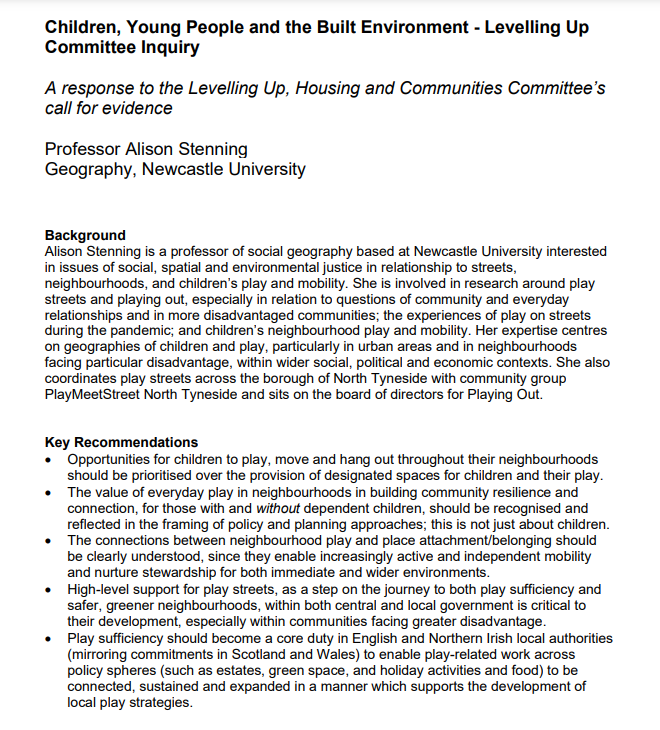With a group of activists, professionals and academics, led by Tim Gill, Playing Out and allies, I was involved in a call for a Parliamentary Inquiry into Children and the Built Environment in spring last year. In late November, the Levelling Up, Housing and Communities (LUHC) Committee launched an inquiry, framing their focus as follows:
It’s important for children and young people’s mental and physical health that they have access to spaces to play and to socialise. In our inquiry, we want to find out more about how children and young people experience outdoor spaces in towns, cities and rural areas across England. What policy interventions from local and central government could help to deliver streets, estates, villages, neighbourhoods and parks that enable kids to enjoy active outdoor lifestyles and engage with others?
Over 100 people and/or organisations submitted evidence to the inquiry, and oral sessions begin next week in the House of Commons.
I joined dozens of other experts and allies, from spheres as diverse as play, children’s rights, planning, green space, architecture and housing, in a joint statement of evidence, which concluded:
Children’s needs in the built environment have been ignored by Government policy for too long, resulting in enormous damage to their health, happiness and wellbeing – and incalculable cost to society. This now needs to change. The positive impact of prioritising children’s needs in this area could be enormous. Many organisations and experts would gladly contribute to developing a new Government policy approach to children and the built environment, ensuring children can safely access the space outside their homes and across their wider neighbourhoods, giving them the free play, social contact, freedom, healthy development and physical activity they need and benefitting society as a whole.
I also submitted an individual statement of evidence, focused on the connections between play, children’s everyday geographies, and questions of community, aiming to highlight how important children’s play on streets and in neighbourhoods is not only for children’s developing sense of belonging, place attachment and everyday mobility, but also for their wider communities. I draw on my own research, but also on strong evidence from decades of playwork, geography and related research and practice, and, of course, on the experience and expertise of Playing Out (who also submitted their own evidence).
I will be giving evidence next week at the House of Commons, alongside both experts in children’s mental and physical health and activists and campaigners. These sessions will be broadcast live on ParliamentLive.TV.
All of the submitted evidence will be published as the oral sessions get started, and I’ll update this post to include a link.

